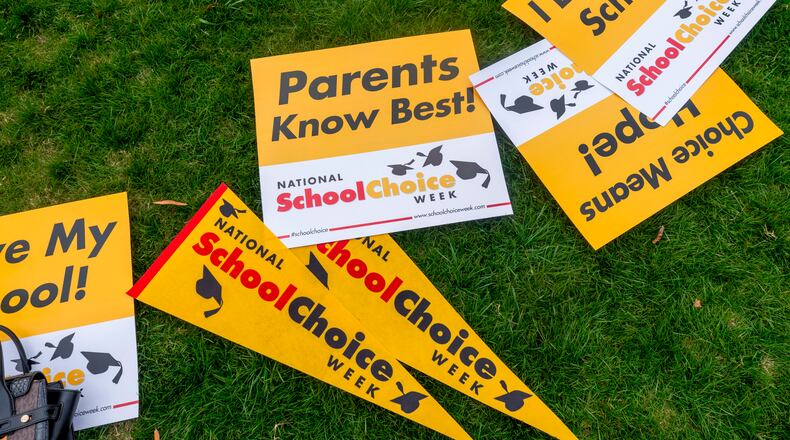School choice continues to be popular with families, taxpayers and politicians as shown by the Georgia Legislature’s approval earlier this year of a school voucher program open to all students in lower-performing public schools.
Since 2021, 15 states have created universal school choice programs that allow families to use state taxpayer funds to find the best educational settings for their K-12 children, including private schools. And for good reason: School choice policy is based on sound theory and supported by rigorous research.
Though school choice has existed in the United States since 1869 and has been supported by other public intellectuals, many people consider Nobel laureate Milton Friedman to be the modern father of the school choice movement.
Credit: Contributed
Credit: Contributed
In his 1955 essay “The Role of Government in Education,” Friedman proposed a K-12 education system in which the government would fund education without directly operating schools. The competitive pressures of schools competing for enrollment would in theory improve the quality of education for all consumers.
Friedman’s ideas have been echoed by economists like Stanford University’s Caroline Hoxby, who suggested that school choice could be a “tide that lifts all boats.”
Empirical research supports Friedman’s theoretical claims. Randomized controlled trials (in which students are randomly assigned to a group that receives an opportunity for school choice or to a control group that does not receive the choice opportunity) are universally regarded as the gold standard of social science research. A meta-analysis (a research technique used to capture the weight of evidence) of gold standard public charter school research concludes that charter schools produce achievement gains in both math and reading. A similar meta-analysis of gold standard private school choice research concludes that these programs produce positive achievement effects on student learning as well.
The findings of this gold standard research stand in contrast to some of the negative findings of less rigorous studies on which critics of school choice have relied to make their case. Two oft-cited recent studies, for example, include evaluations of Ohio’s EdChoice Scholarship Program and the Indiana Choice Scholarship Program. The authors of the Ohio program readily admit that their models “are not ideal because there may still be unobserved differences EdChoice participants and nonparticipants.” Similarly, the authors of the Indiana study state, “Without a random-assignment of vouchers or a natural experiment such as a lottery, any assessment of the effects of Indiana’s voucher program is subject to selection bias.”
The weight of evidence derived from the most believable estimates — that is, random assignment studies — concludes that school choice generates positive test score effects.
One systematic literature review of “competitive effects” research on private school choice programs finds that these programs have a neutral to positive effect on the students who remain. When schools compete for enrollment, the quality of education often improves for all students.
School choice produces benefits beyond standardized test scores. Another meta-analysis finds that private schools produce positive effects on various civic outcomes, including political tolerance; political participation; civic knowledge and skills; and voluntarism and social capital. Other studies find that attending a parent-preferred school produces long-run benefits on students’ health and labor market outcomes while reducing criminality and teen motherhood.
These results are only possible if parents are sensitive to differences in school characteristics that are related to their children’s needs. The evidence resoundingly suggests that they are.
Furthermore, school choice produces savings for taxpayers. Compared to district public schools, charter schools on average are funded about $6,000 less per pupil. Private school choice programs are funded at an even smaller fraction of public school per-pupil expenditures. One study of 40 choice programs estimated that they generated upward of $28.3 billion in taxpayer savings.
Given the weight of evidence in favor of school choice, it is no surprise that critics have had to resort to inventing new arguments. Critics such as Michigan State University voucher researcher Josh Cowen have denigrated popular support for school choice as something conjured up by conservative billionaires pushing a right-wing agenda. He ignores the tremendous support for school choice among Democrats, Black parents and Hispanic parents and growing support among Jews, Muslims and other religious groups.
School choice is good for student learning, good for other important student outcomes and good for taxpayer savings. Universal school choice would be good for Georgia too.
Matthew H. Lee is a clinical assistant professor of economics at Kennesaw State University. The views expressed here are his alone and do not necessarily represent the views of KSU.
About the Author
Keep Reading
The Latest
Featured




